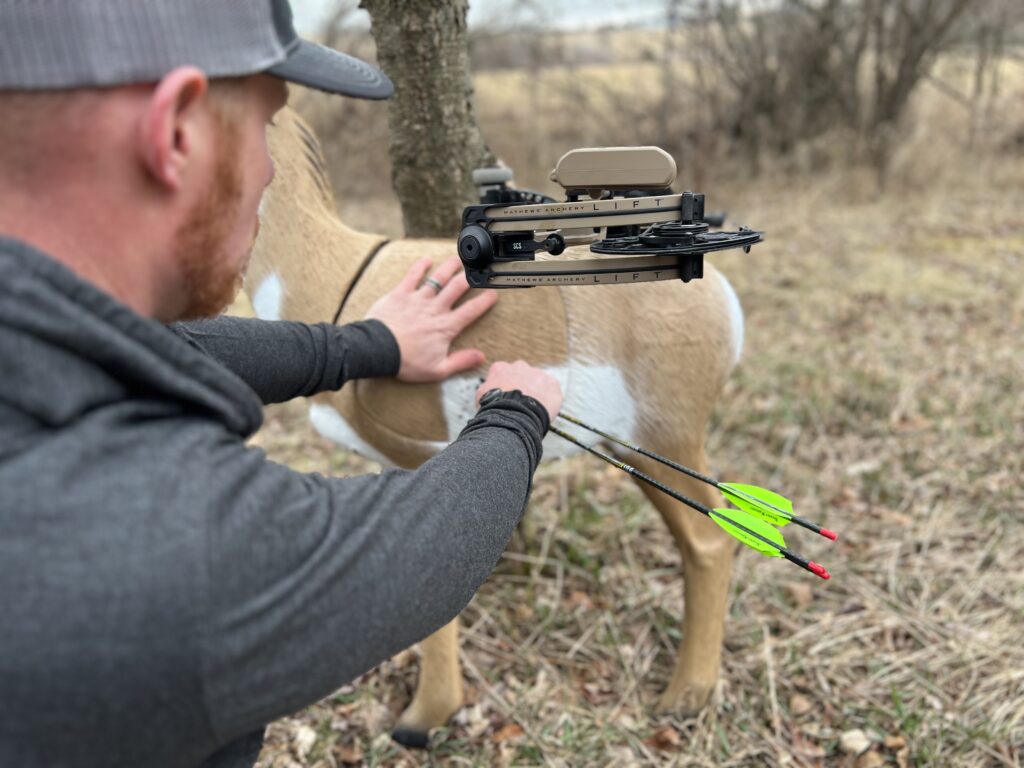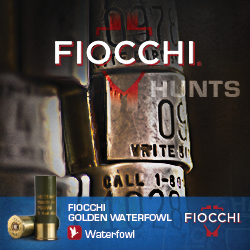This duet delivers precision accuracy you can count on at the moment of truth.
by Darron McDougal
The old public-land battler crested a distant hilltop as the sunrise spilled across the rolling prairies, his hide glowing in the orange morning light. A whitetail with width between his horns can take your breath away, and he certainly took away mine as his wide frame filled my binoculars. My wife, Becca, and I had been following a herd of muleys when the lone whitetail appeared. My tag was valid for either species, so I shifted gears.
I slinked downhill, keeping a low profile, and when the feeding buck sank into a draw, I scuttled ahead of him, settled in with a hill behind me to disguise my silhouette, and then waited for him to feed by in the draw below. A few minutes passed. Nothing. Worried that he’d changed his course, I tip-toed in the direction I expected him to come from. Antler tips! I hoped he’d follow the draw and give me a 40-yard shot, but he continued feeding in the same spot, occasionally snapping his head to scan his surroundings.
He’s probably in range, I thought to myself. My Hawke rangefinding binocular read 55 yards. Dialing my UV Slider sight, I breathed, then drew my Mathews LIFT 29.5. My pin danced in the slight crosswind, and a Rage-tipped Victory VAP SS 350 soon launched. It arced up and then dropped. A thud confirmed a solid hit. As if shot from a cannon, the buck ripped across the prairies at high speed, crimson painting his ribcage. He paused on a slope 200 yards away, then tumbled.

The author stalked this 20-inch-wide whitetail during late season on public land and took it with the bow/arrow combo discussed in the article. (Photo by Becca McDougal)
Every piece of equipment played an important role in making that longer-than-average shot, but for this review, I want to focus on two in particular: Victory’s VAP SS and Mathews’ LIFT 29.5. Follow along.
Victory VAP SS
I’ve shot a handful of different Victory Archery arrows since 2013. All have exceeded my expectations in accuracy, durability, and tolerances. Always interested in the heart of a company, I spoke with Victory’s Steve Greenwood back in 2015 to better understand the brand. I found it amusing that Aldila, a golf-shaft manufacturer, owns Victory.
“We produce all of our arrows and golf shafts in our factory,” Greenwood explained. “We don’t outsource our production, so we can control the entire manufacturing process completely. All of the carbon-based raw materials are produced by Aldila’s advanced materials division in Poway, California, and shipped to our state-of-the-art Vietnam factory. Aldila has produced only carbon-based products for decades, beginning when the material became available for non-defense-related activities.”
As for the VAP SS 350 that I slipped through the wide whitetail’s ribs last December, let me outline why it is so deadly. The first factors are straightness and grain-weight tolerances. VAP SS shafts are sorted into three grades: Sport, Gamer, and Elite. I love to launch arrows at more than 100 yards during my spring and summer practice, and once in a while, I take a more extended shot at game — within reason — when everything feels right. The VAP SS Elite is a natural fit for what I do because it is rated +/- .001 inch for straightness, and every shaft in a dozen is within +/- .5 grains of the rest.

They are straight and consistent in weight tolerance and maintain their straightness and integrity by design. Most archers and bowhunters are familiar with carbon/aluminum arrow-shaft construction, but Victory takes a different approach to fusing carbon and metal. “SS” stands for stainless steel. The VAP SS uses a stainless steel mesh impregnated with resin, and then it’s rolled up with a 90-degree Advanced 3K carbon-fiber weave. This minimizes torque, allows faster in-flight recovery, and tightens up spine consistency.
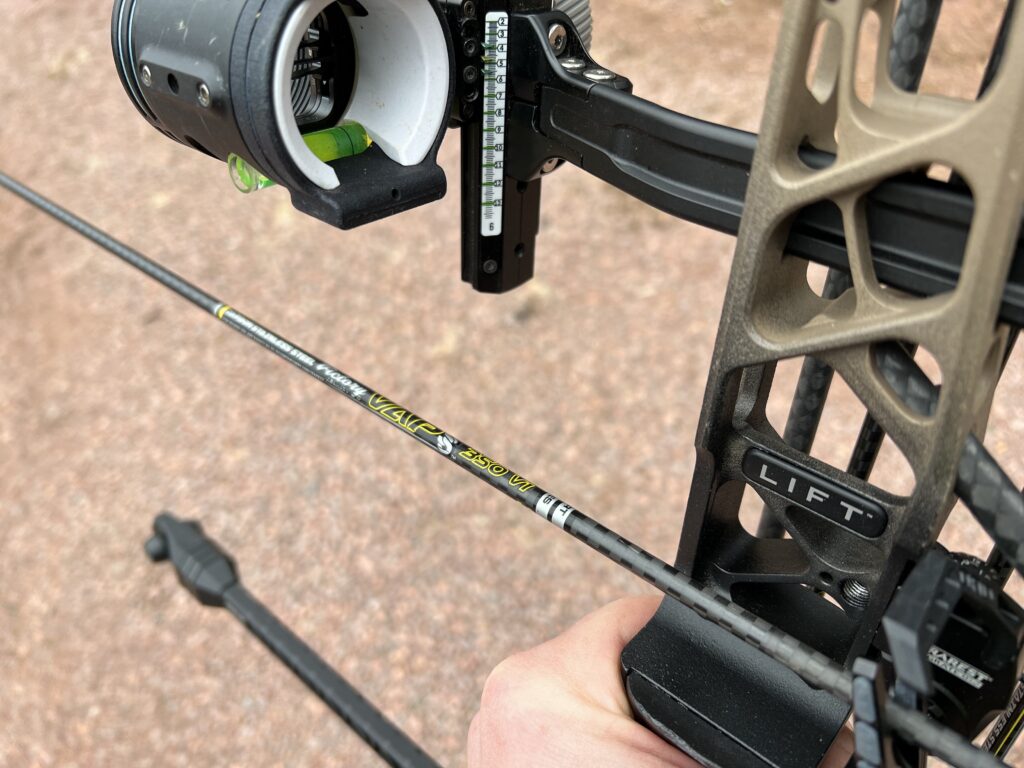
Victory Archery’s VAP SS features stainless-steel mesh bonded with Advanced 3K carbon weave for the ultimate in straightness and durability. (Photo by Darron McDougal)
The VAP SS has a .166-inch micro-diameter design to minimize wind drift. That design, combined with its ICE Nano-Ceramic coating, maximizes penetration while making target removal easier. It groups well, even at longer distances, in windy conditions and pulls nicely from targets.
I build my arrows, and the process begins with checking each shaft for straightness. I’ve sorted dozens of arrows in my day on a Pine Ridge Arrow Inspector, and quite a few arrows rated +/- .001 inch fell far short. VAP SS shafts didn’t disappoint; the straightness across two dozen shafts was on point. I fletched my VAP SS 350s with Silent Knight 3-inch vanes and inserted them with the optional 75-grain stainless-steel SHOK insert for added durability and FOC. By the way, this insert fits over the end of the shaft rather than butting up to it, which adds strength to the front of the arrow to defy hard impacts.
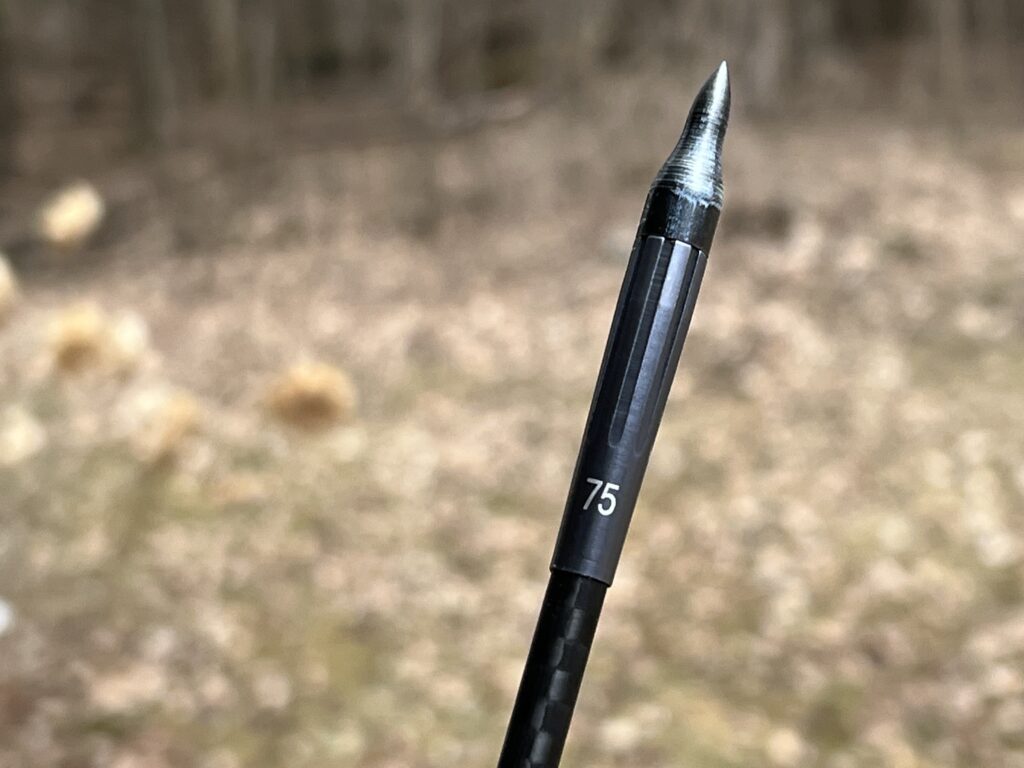
The VAP SS comes standard with an aluminum SHOK insert, but the author opted for the 75-grain stainless-steel version for added durability and FOC. The SHOK insert design fits over the end of the arrow to strengthen the arrow during hard impacts. (Photo by Darron McDougal)
While shooting groups out to 120 yards, I can attest that this arrow is superior to any I’ve owned in 22 years of bowhunting. It tunes and groups well. It maintains its tolerances — very important for long-range accuracy and consistency. And it’s incredibly durable. It’s the kind of arrow I’d use with complete faith on any big game hunt.
Mathews LIFT 29.5
A great bow is in front of every great arrow, and Mathews hit it out of the park with its new LIFT. I’ve been testing and hunting with the 29.5, but there’s also a 33 for those who demand extra stability (not that the 29.5 lacks it).
While the LIFT shares many features with last year’s Phase4, it has some brand new attributes that make it even better. Most notable is that the 29.5 model weighs 3.99 pounds, about half a pound lighter than the Phase4 29. And it isn’t just lighter; it balances better, too. Next to my Phase4, the LIFT’s Bridge-Lock Riser flaunts many more details in a sleeker, trimmer design without sacrificing strength.
The LIFT also flaunts a new cam system called the SwitchWeight X Cam. During the draw cycle, the weight stacks slightly differently than the predecessor CrossCentric Cam featured on the previous few flagship bows. If anything, the weight seems more evened out throughout the draw cycle, and it feels like it lets off into the valley a little bit more smoothly than the CrossCentric Cam.
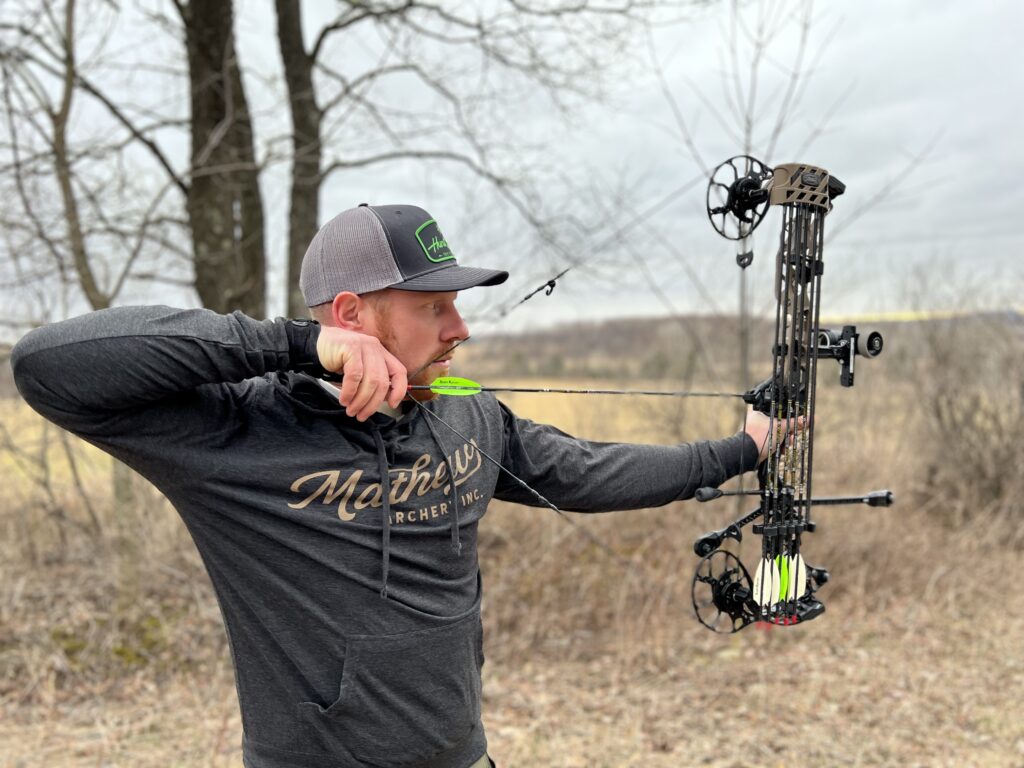
The Mathews LIFT 29.5 is unbelievably stable, thanks to it’s long and sturdy Bridge-Lock Riser. The author has shot this rig out to 120 yards in his backyard with stunning accuracy. (Photo by Becca McDougal)
The SwitchWeight X Cam looks a little trimmer and exhibits more detailed cutouts than the CrossCentric Cam, another way the LIFT ended up half a pound lighter. As you probably guessed, the new cam is compatible with SwitchWeight modules. You can adjust the LIFT 29.5 from 24.5-31.5 inches and 55-80 pounds via SwitchWeight modules, available in 80 or 85 percent let-off. What I love most is that it’s the fastest hunting bow I’ve had. It hits 395 fps with my 27.5-inch draw length at a little over 72 pounds with a 441-grain VAP SS 350.
In the past, I’ve always put custom bowstrings on my bows because stock strings often leave something to be desired. But Mathews rigs the LIFT with its all-new MATCH bowstring and cables. They’re custom-built in-house from a proprietary BCY 452X ultra-low-wax fiber blend designed to optimize the LIFT’s performance. The quality, dependability and performance far exceed previous Zebra Bowstrings.
Conventional limb axles slide through the middle of the limbs, but the LIFT has a proprietary new top-mounted axle, allowing for shorter limbs — another way that weight was reduced. The axle now passes through a machined component that fits on top of the limbs like a glove, yielding a more robust, stabler, and dependable system.
The Mathews LIFT’s Engage Grip is compatible with the new Shot Sense electronic module, which tracks, records, and analyzes every shot in real time. Past shots can be reviewed and compared to other shots. This accessory can help you identify flaws in your shooting so you can tighten up your game. Never before has it been easier to learn about your shooting so that you can become more accurate.
Mathews offers the tricked-out new Integrate MX2 rest, which boasts a beefier launcher and silencing material cladding. Finally, new finishes have debuted on the LIFT, including Earth, Mossy Oak Bottomland, and the new Fade-To-Black Series. I went with the Earth Fade-To-Black series, and it’s drop-dead tactical.
I won’t dwell too much on the features that carried over from the Phase4, but I’ll quickly touch on my three favorites. Resistance Phase Damping (RPD), which uses eight individual limbs with silencing rubber between each pair, yields a shockingly quiet and vibration-free shot. I loved it on the Phase4, and I love it on the LIFT. Of course, utilizing all of the built-in accessory mounts with compatible accessories yields an unrivaled balance. It feels phenomenal. And the last one is the Bridge-Lock Riser. While shooting in the backyard at 120 yards, I’m amazed such a short bow can aim so well at such distances. I used to shoot 34- to 35-inch bows, but a long and stable riser negates the need for a longer bow. The LIFT’s stability is superb.
Like a Match Made In Heaven
There are many bows and arrows on the market, and I test-review several different ones each year for another media platform. But there’s just something different about this combination. Confidence in equipment is important, and whether I’m shooting in the backyard at 120 yards or drawing back on a whitetail at 55 yards, I feel deadly with this duo. I’m sure you will, too.
